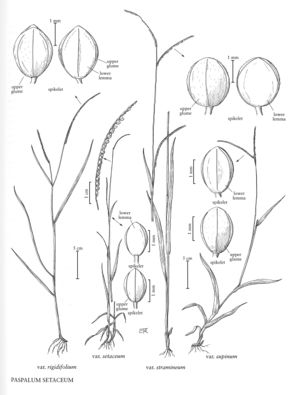Paspalum setaceum var. stramineum
Common names: Yellow sand paspalum
Synonyms: Paspalum stramineum Paspalum ciliatifolium var. stramineum Paspalum bushii
Treatment appears in FNA Volume 25. Treatment on page 592.
Revision as of 17:57, 11 May 2021 by imported>Volume Importer
Plants erect to spreading. Leaves mostly cauline; blades to 30 cm long, 3.3-13.5 mm wide, lax to somewhat stiff, glabrous or with a few hairs along the midrib, sometimes pubescent, yellow-green to dark green, margins scabrous, ciliate. Panicle branches 4-12 cm; branch axes 0.6-1.1 mm wide. Spikelets 1.7-2.4 mm long, 1.5-2.1 mm wide, obovate to suborbicular, pubescent or occasionally glabrous; lower lemmas without an evident midvein; upper florets 1.7-2.1 mm.
Discussion
Paspalum setaceum var. stramineum grows at the edges of forests and in disturbed areas with sandy soil. Its range extends from the central plains and eastern United States to Mexico, Bermuda, and the West Indies.
Selected References
None.
Lower Taxa
None.
... more about "Paspalum setaceum var. stramineum"
Yellow sand paspalum +
Conn. +, N.J. +, N.Y. +, Va. +, Del. +, D.C. +, Wis. +, W.Va. +, Ont. +, Fla. +, N.H. +, N.Mex. +, Tex. +, La. +, Tenn. +, N.C. +, S.C. +, Pa. +, Mass. +, R.I. +, Vt. +, Puerto Rico +, Colo. +, Md. +, Ala. +, Ark. +, Ill. +, Ga. +, Ind. +, Iowa +, Ariz. +, Kans. +, Nebr. +, Okla. +, Ohio +, Mo. +, Minn. +, Mich. +, Mont. +, Miss. +, Ky. + and S.Dak. +
Present +
Paspalum setaceum var. stramineum +
Paspalum setaceum +
variety +
